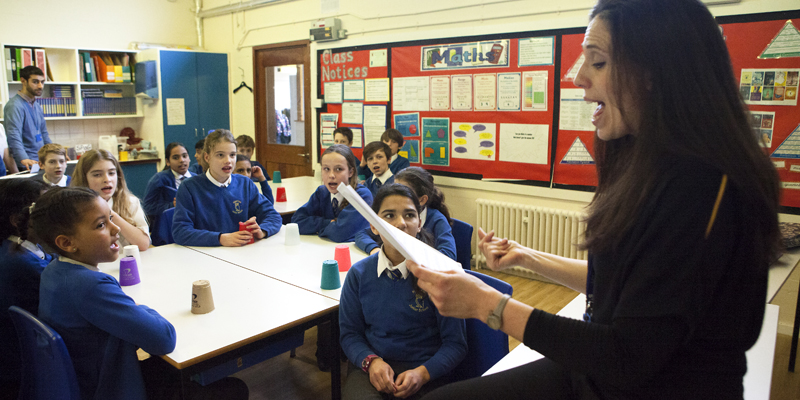Take a moment to think about an ideal school environment.
You might imagine a calm, well-operating and friendly, happy school, where:
- children feel welcome, safe and secure
- children arrive focused, enthused and ready to learn
- learning challenges are met with determination, optimism and self-belief
- there is a strong sense of teamwork in each class and across the school among staff and pupils alike
- children and staff take pride in their school
- children with additional needs are supported and included
- parents, carers and the wider school community feel part of the school and are positive about its achievements and ethos.

Embedding regular singing into school life is a way of ensuring that these attributes develop over time. At Sing Up we have seen countless examples and collected many case studies where the school community themselves believe that singing that has transformed their school.
Looking at it the other way around, it is uncommon to find schools where these ‘ideal’ factors are present and where there is no school commitment to singing, music or another art-form.
A singing school is a place not just where singing happens regularly, but where singing is right in the middle of school life rather than on the periphery. It is a school where singing is an everyday activity for all children. It is a place where the whole school community knows and can describe the imact singing has in their school.
But changing or developing a school’s culture first requires a change in beliefs and attitudes. Then a renewed focus on music can begin.

For children and their parents
Children and young people are typically more inclined to engage with an activity they enjoy and can see a purpose to – they want to know, what’s the point? So, to truly engage children we could help them further to see the lasting value of pursuing singing and music.
Chorus America’s Choral Impact Study documented the connection between choral singing participation and children’s attainment in the classroom. The study found that children who sing in a choir tend to get significantly better grades than their classmates who don’t take part in choir. A real driver for children of today, who are under high levels of pressure to achieve, could be the fact that taking part in music can have a lasting positive impact on their success in life, whichever career path they wish to follow.
If children understand the continued value of participation in singing and have access to quality provision they’ll quickly become your best advocates for music.

For teachers and school leaders
There is frequently a lot of impassioned discussion about whether the reasons for encouraging and supporting children to sing regularly are fundamentally intrinsic or extrinsic. I would argue that they are both, and that the extrinsic and intrinsic benefits are deeply connected to one another.
Extrinsic benefits might include things like:
- A memory and learning aid
- Improved reading and language skills
- Better teamwork and collaboration
- Fostering creative thinking and problem-solving skills
- An increase in self-esteem and confidence
- Health benefits – neurological and respiratory benefits as well as psychological ones
While intrinsic benefits might include:
- Learning musicianship skills
- Becoming a better singer
- Enjoying an expressive and creative experience for its own sake
The creative arts – music in particular — are known to have a powerful positive impact on a school environment and on learning outcomes for pupils. And of the musical activities that you can embed in your school most readily and inexpensively, singing is the most accessible of all, and the most adaptable and versatile. Becoming a singing school motivates the school community to work together towards a common goal while taking part in an activity that everyone can do and enjoy.
The quality of the artistic output itself of course cannot and should not be completely disregarded. But as children and young people have a varied natural ability; diverse cultural references and backgrounds; and relative privilege or deprivation, it can be unhelpful to set firm benchmarks of the level they should be able to achieve in their singing or music-making.
What is important is the journey. That you begin in one place, able to do certain things, and then progress to a point where you can do those things better and learn to tackle new challenges with enjoyment and a sense of achievement, rather than anxiety and pressure.
Members of school staff can’t be left out of the picture either. Pretty much all of the best singing schools have some sort of staff singing. The benefits of singing with your co-workers are enormous; it helps you bond, boosts your confidence as a vocal leader, and helps to give all staff the confidence to sing in the classroom.

For all of us – singing is for life!
Singing regularly in a group is beneficial at all stages of your life. Possibly the best evidence for this is that successful people from all industries take time out of their busy days to sing as part of an amateur choir. They’ll spend hours every week rehearsing and will even use precious annual leave time for concert days.
I was fortunate to sing with a wonderful school choir in my teenage years which, clearly, has had a major impact on my career and life-choices! Singing is both a fantastic escape and requires intense focus, which can ease away any stresses from the working day. Mobile technologies and an always-on mentality mean that it’s all too easy to end up working through your evenings, and to not take time out; a choir gives you a ready-made community to spend time with. The bond of singers in a choir is an extraordinary one and friendships made within a choir can be a gift for networking.
Let’s give children opportunities to sing regularly from early years onwards – then not only are we potentially preparing musicians and singers for the future, we are giving them a source of enjoyment, connections, health, and wellbeing for life.
Want to receive cutting-edge insights from leading educators each week? Sign up to our Community Update and be part of the action!


















